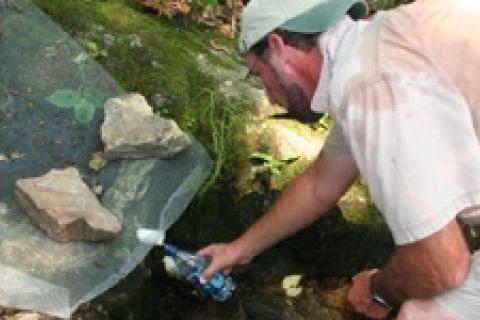
Summer hiking offers challenges that are absent during the other seasons, such as adult insects wanting a sip of your blood and thunderstorms throwing lightning bolts at you. Those things can be deadly, but so can ignoring the weather when a thermometer is reading in the red zone. Overheating on the trail is a serious situation that can be easily avoided by using the correct gear, planning accordingly, and following common sense.
 |
| Be sure to pack plenty of water, as springs may dry up in the summer heat. |
When the heat is on, plan to hike early in the day or do a short trail later in the afternoon, avoiding the high-noon sunrays. Allow additional time so the pace can be slower than your normal speed. If the terrain allows, target trails with less incline and decline to keep the spent energy level down. An extra supply of water is a must on a hot hiking trail. During dry spells, creeks that normally provide water for running through your water filter may be absent or trickling at best. So although going lightweight during hot hikes is a good thing, leaving an extra bottle of water behind in the vehicle is a bad decision. Pack water. And even better, take along a few packets of electrolyte powder to add to your drinking water to keep your energy up.
Heat exhaustion can sneak up on a person in short time. Watching for the symptoms of heat exhaustion is important, especially if you're on a trail miles from help. Heat exhaustion is caused by excessive loss of fluid by sweating and the body not cooling properly. The first sign of overheating is dehydration. Along with dehydration is a rapid pulse rate that sometimes is followed by fainting. Wearing moisture-wicking clothing helps the body stay cool.
Other symptoms of heat exhaustion include growing weakness, anxiety and nausea. If hiking with others, watch for these signs. A victim of heat exhaustion may complain of weakness as a first alert. First step to relieve the problem is to remove the person from direct sunlight and into shade. Allow the victim to relax and focus on cooling him or her. Next, start replacing fluids in small amounts. If heat exhaustion is untreated, it may lead to a heat stroke. If possible, get medical help before it leads to such extreme trouble. If heat exhaustion hits you or a hiking companion, don't allow the ego to push the person into worse trouble. Stop, relax and replenish fluids. When the victim regains focus and strength to continue, then and only then do you move on.
- 2821 views

